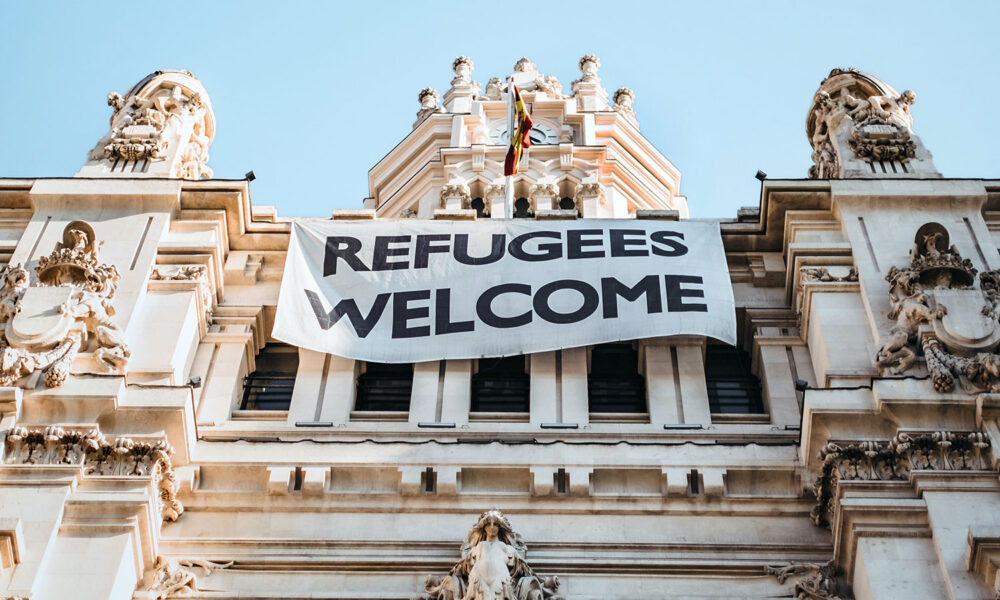In honor of Human Rights Day on December 10, the Union of Concerned Scientists feels it is important to discuss and address the limited rights of African immigrants in the Global North as it pertains to the Ukraine War. This post is the first installment of a series of blog posts highlighting how people of African descent are being further disenfranchised in relation to the Ukraine War.
Russia invaded Ukraine February 24, 2022, and that same day, harrowing reports of discrimination were making it out of the Ukraine-Poland border.
Many African students reported a “Ukrainians First” policy in which Black people were denied access to transportation during evacuation from Ukraine until after all white refugees found safety across Ukraine’s border.
There are few Black Ukrainian nationals. But for those who are both Black and Ukrainian, this racist double standard is an everyday norm, especially in war-torn Ukraine.
There were 76,000 African students in Ukraine at the start of the war, and the majority were studying medicine or seeking engineering degrees that were not available in their home country.
One Nigerian medical student, Rachel Onyegbule, reported being stranded by public transit roughly 400 miles from Ukraine’s capital after she and other foreigners were forced off at a check point on the way to the Polish border. Rachel was later informed after ten buses passed that she would have to walk to the border from there while white refugees rode to safety.
Another Nigerian student, Ruqqya, told the British Broadcasting Company she walked overnight for 11 hours to the Poland border in Medyka only to be told she could only cross the border after white Ukrainians reached safety first.
Another student, Asya from Somalia, recounted a hotel being for “Ukrainians Only” so Black people were sleeping on the street. There were reports of border patrol abuses, tweets of white Ukrainians blocking Africans from getting on the trains for refugees, and even the Nigerian president condemned the actions of NATO nations toward Africans, emphasizing the universal rights under the United Nations Convention on Refugees.
The UN Universal Declaration of Human Rights states that everyone has a right to a standard of living adequate for their health and welfare, but access to safety and vital services like healthcare are often inadequate or nonexistent for African immigrants residing in the Global North. And this lack of human rights is further exacerbated by war.
It is important to note that 80% of all African immigrants migrate to another nation within the African continent, however, for those who do not, they are often met with discrimination.
What does security mean and who gets to be secure in Global North?
Many nations in the Global North attempt to create security for themselves by building nuclear weapons and enormous, ceaselessly modernizing militaries. In fact, the US military budget is much larger than all nations in Africa combined, and has also not been well managed for some time yet is continuously receiving more funding.
Historically, Black and Brown lives have borne more of the risk from building these nuclear weapons.
While the world was shocked by the horror of Russia invading Ukraine, Black folks were additionally shocked at how comfortable reporters were referring to Europe as “civilized” nations and referencing how this kind of conflict was unheard of in Europe.
This rhetoric makes it clear the Global North expects civil unrest in the Global South and ignores the Global North’s political influence on and encouragement of such unrest.
Furthermore, the entire world suffers by Ukraine being invaded. Disruptions to trade, supply chains, surges in refugees, and food shortages leading to famine in Somalia and civil unrest in the African Diaspora.
On top of this, the world has continuing inflation and global pandemics still raging with the added worry of Russia’s nuclear blackmail.
Additionally, it’s important to understand the Global South leads the world in not having nuclear weapons, and South Africa is the only nation to have built their own nuclear weapon and voluntarily disarmed later.
No changes To European laws in the aftermath
Eventually, due to word of mouth many people of African descent eventually found reprieve in Hungary or Romania at the start of the war.
And of the estimated 10,000 African students who have settled in other parts of Europe, they must re-enroll at local institutions—often for more tuition. They also only had two weeks to three months to figure out their next steps before being considered an illegal resident.
During the 2022 Carnegie International Nuclear Policy Conference (NukeCon), I asked Katja Keul, a NATO representative from the German Minister of State Federal Foreign Office, how NATO held or planned to hold NATO nations like Poland accountable for racism at Ukraine’s border.
This accountability could be through formal condemnation or even sanctions for denying African migrants passage into their borders.
However, in her response, she stressed the importance that nothing illegal happened at the borders. When laws allow for governments to act inconsistent with the obligations to human rights set forth by the UN, lawmakers need to stop and consider a change to their laws.
Far too often, European laws allow for the open and blatant mistreatment of Africans at and within their borders, which allows European leaders to dismiss the harms committed against African immigrants at its borders.
To this day, two different tracks for refugees—the Black people and everyone else—still exists at many borders in the Global North. For people of African descent, the track includes long waits, being denied arbitrarily, extra expenses, and dehumanizing treatment.
European Commission must update antiracism action plan to address immigration
Four months after the killing of George Floyd, the European Commission published their first Anti-Racism Action Plan which aims to develop ways to counteract historical racism in Europe with a five-year plan.
The Platform for International Cooperation on Undocumented Migrants (PICUM) has lots of ideas for how to update the Europe Commission’s Antiracism Action Plan to include immigration. The following recommendations are directly from the PICUM:
- Mainstream anti-racism in migration policies, integrating the racial equality dimension throughout the legal and policy European Union (EU) framework on migration. This will also involve looking at the specific ways structural, institutional and individual racism are faced by migrants in Europe (including at the borders) and devising concrete measures to fight against it.
- Counter discriminatory policing and racial profiling. The EU must tackle police brutality and racist abuses by law enforcement to protect those who are most likely to experience it, regardless of migration status. “Everyone should feel safe in Europe” and migration and border controls cannot be put before the safety, rights and lives of people. Strong accountability measures and access to justice are key to address this problem and the EU should make them available within the EU, at its borders and beyond – wherever its migration policies are implemented.
- Ensure “real mutually beneficial” partnerships with third countries. Moving forward, the EU’s relationship with the global South cannot replicate the unequal arrangements rooted in past colonial ties to impose its own agenda and goals – an agenda that harms the very people concerned. To avoid perpetuating neo-colonial dominance, the EU must mainstream anti-racism in its foreign policy (across all areas), instead of mainstreaming migration control, and work on global justice and reparation measures. Further recommendations on how to ensure “real mutually beneficial” partnerships with third countries have been put forward by migrant rights advocates.
- Teach the past to understand the present. Acknowledge and teach the historical roots of racism to foster a better understanding of migration in the present and counter ahistorical and race-blind approaches to migration policies.
- Promote narratives consistent with the dignity of all. In addition to combatting disinformation and racist and xenophobic messages in the media, EU institutions should promote the same regarding political discourse targeting migrant and racialised communities. This will help to fight against ethnonationalist rhetoric that fosters discrimination of such groups.
And these laws need to create extended protections during war. If the EU truly commits to disrupting these historically and currently racist systems, it can create a Europe that is both welcoming and safe to all people no matter their race, ethnicity, country of origin, or social status. This type of Europe only stands to benefit from the talents of these migrants. As PICUM poignantly outlines, immigration is the first step to equality in any nation, and therefore a pivotal part to creating a more just world.
An earlier version of this post incorrectly stated the date of the Russian invasion of Ukraine.

